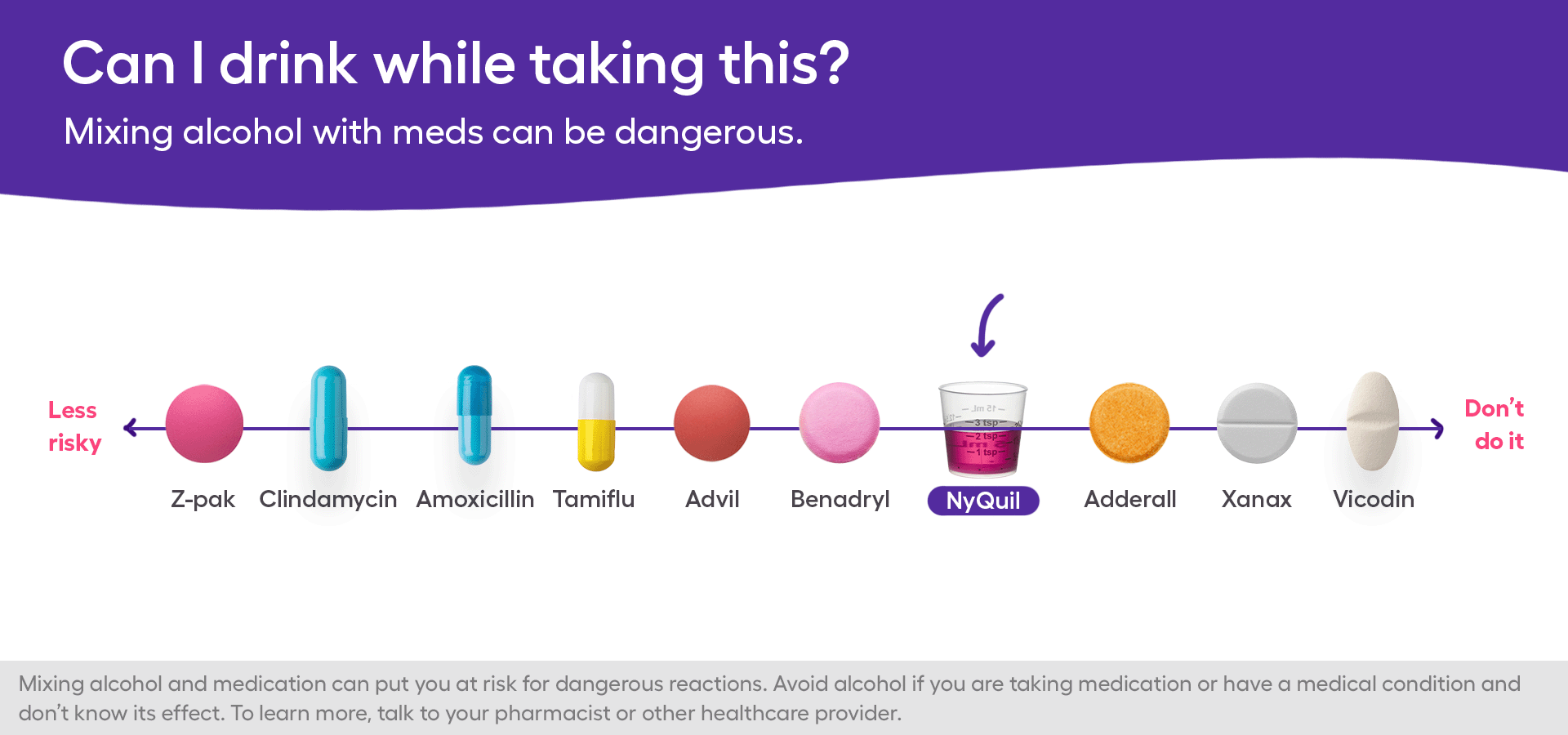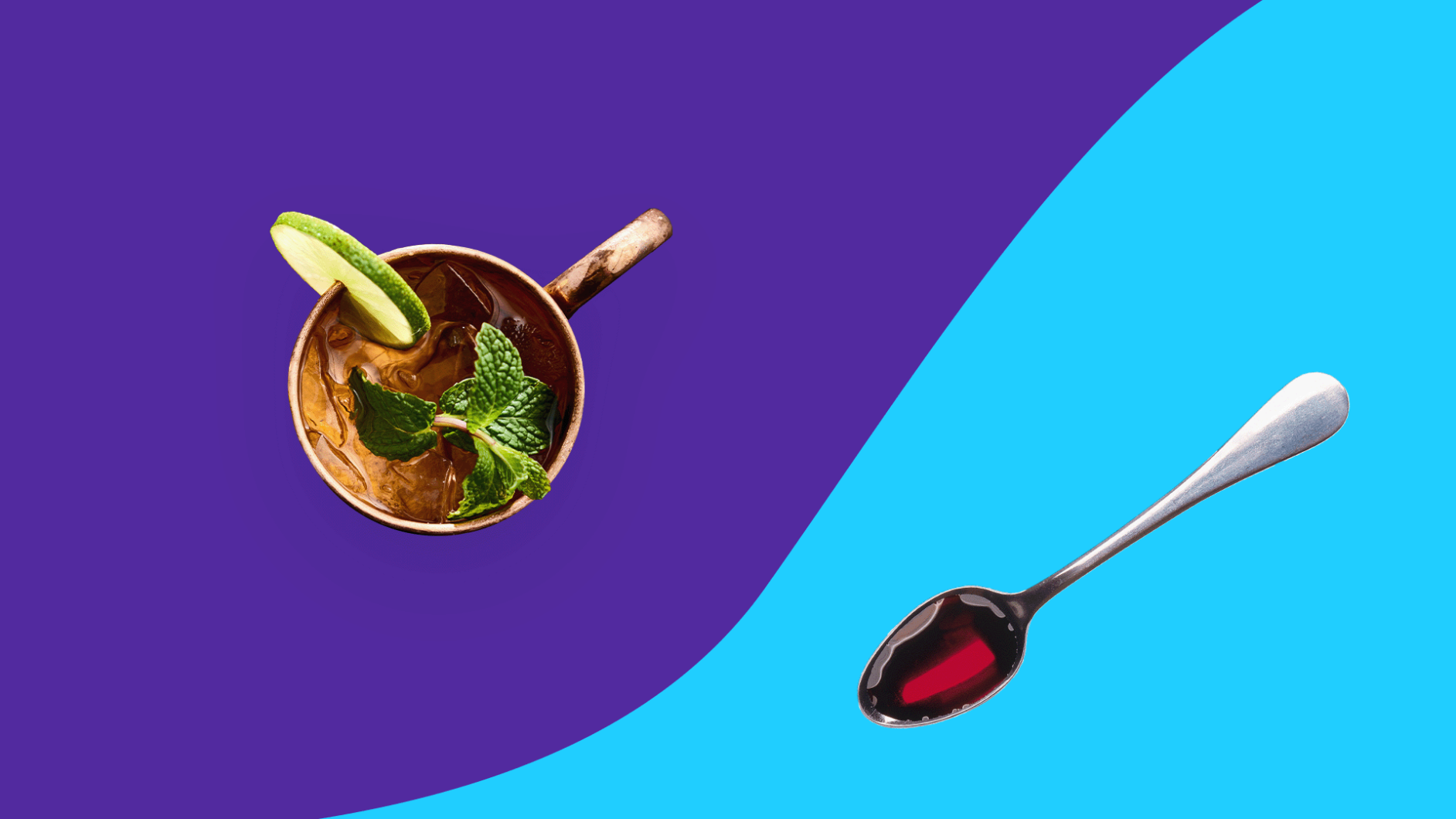Key takeaways
Mixing DayQuil and alcohol is not recommended due to the risk of increased side effects such as drowsiness, dizziness, nausea, and severe liver damage.
DayQuil contains acetaminophen, dextromethorphan, and phenylephrine, which can interact negatively with alcohol, amplifying adverse effects and potentially causing serious health issues.
Consuming alcohol while taking DayQuil can also weaken the immune system, potentially worsening cold and flu symptoms and counteracting the medication’s benefits.
To avoid serious interactions, it’s advised to wait until the effects of DayQuil wear off before consuming alcohol, and consider alternative remedies or over-the-counter medications that do not interact with alcohol.
Mixing DayQuil and alcohol is a common concern for people who are looking for relief from cold and flu symptoms. Due to the risk of increased side effects and interactions, it’s not generally recommended to combine these two substances.
It’s possible to experience side effects even when taking DayQuil at the recommended dosage and drinking alcohol in moderation. Mixing the two could lead to drowsiness, dizziness, and nausea. In severe cases, mixing DayQuil and alcohol could cause liver damage.
Continue reading to learn more about what happens when you mix DayQuil and alcohol, the potential dangers, and how to prevent serious interactions.
What’s in DayQuil?
Not to be confused with NyQuil (the cold medicine that is meant for nighttime symptoms), DayQuil is a common cold medicine that is meant to be used during the day. It is marketed as a non-drowsy medication, although it may contain an active ingredient that causes drowsiness in some. Unlike some NyQuil products, DayQuil does not contain any alcohol.
The original DayQuil, manufactured by Vicks, contains acetaminophen, dextromethorphan, and phenylephrine. Acetaminophen is a pain reliever and fever reducer; dextromethorphan (also known as DXM) is an antitussive or cough suppressant; and phenylephrine is a decongestant.
There are various formulations of DayQuil that come as a liquid capsule, coated caplet, or liquid and contain different ingredients. DayQuil Severe contains the same ingredients as the original DayQuil plus guaifenesin, an expectorant that thins and loosens mucus. DayQuil Cough contains dextromethorphan, guaifenesin, and phenylephrine. DayQuil High Blood Pressure contains only acetaminophen and dextromethorphan.
DayQuil is usually taken every four hours as needed for cold and flu symptoms, such as headache, fever, congestion, sore throat, and sneezing. However, it’s not recommended to take more than four doses of DayQuil in a 24-hour period.
RELATED: Cold and flu medicine interactions
Can you take DayQuil and drink alcohol?
Mixing DayQuil and alcohol can be dangerous as the combination may cause unwanted side effects such as drowsiness, dizziness, and nausea. It’s advised to avoid alcohol consumption completely while taking DayQuil to minimize the risk of potential side effects.
Consuming even just a single drink of alcohol while taking DayQuil may amplify certain side effects and increase the likelihood of a bad reaction. To stay safe while taking DayQuil, it’s best to steer clear of alcohol or consult with a healthcare provider.

Side effects of DayQuil and alcohol
The side effects of DayQuil and alcohol may overlap. DayQuil contains a combination of active ingredients that may cause side effects that are amplified by alcohol. These side effects include:
- Abdominal pain
- Lightheadedness
- Dizziness
- Nausea
- Vomiting
- Nervousness
- Restlessness
Serious side effects are more likely to occur with high doses of DayQuil and large amounts of alcohol over time. These adverse effects may include:
- Increased sedation
- Respiratory depression (potentially life-threatening)
- Seizures
- Confusion
- Hallucinations
- Fast, slow, or irregular heartbeat
Drinking large amounts of alcohol with high doses of DayQuil could cause a person to lose consciousness. Mixing the two substances could lead to slow, shallow breathing, which could lead to coma, and in severe cases, death.
Drinking alcohol can also cause dehydration and decrease the function of the immune system, which may worsen cold and flu symptoms. These effects could also counteract the benefits of DayQuil.
DayQuil and alcohol interactions
Acetaminophen and alcohol: DayQuil contains acetaminophen, which is known to cause liver problems in high doses. Taking more than the recommended dosage of DayQuil could lead to an acetaminophen overdose and severe liver damage.
Alcohol can also cause damage to the liver, especially when consumed in excessive amounts. Chronic consumption of large amounts of alcohol can lead to a condition known as alcoholic liver disease, which can result in liver inflammation, scarring, and eventually liver failure. Heavy alcohol use is drinking more than 14 alcoholic beverages per week for men and more than seven drinks per week for women.
People with a history of alcohol addiction and alcohol use disorder should use DayQuil with caution or avoid it altogether.
Dextromethorphan and alcohol: DayQuil contains dextromethorphan, which can cause drowsiness, dizziness, and nausea. In high doses, dextromethorphan can cause confusion, agitation, hallucinations, and even seizures. Alcohol can enhance the sedative effects of dextromethorphan, leading to increased drowsiness, dizziness, and decreased coordination.
Phenylephrine and alcohol: DayQuil also contains phenylephrine, which can increase heart rate and blood pressure. When combined with phenylephrine, alcohol can increase the heart rate and blood pressure even further. This can increase the risk of cardiovascular events, especially in individuals with pre-existing heart or blood pressure problems.
How long after taking DayQuil can you drink alcohol?
Alcohol levels generally peak in the bloodstream within an hour, depending on the amount of alcohol consumed. Alcohol lingers in the blood for around four hours after drinking.
However, the length of time it takes for alcohol to be cleared from the body can vary greatly. In people who drink heavily or those with liver problems, it may take longer for alcohol to be processed. DayQuil lasts for around four to six hours in the body. Therefore, it’s best to wait until after the effects of DayQuil wear off before having a drink of alcohol.
Cold medicine and alcohol
Mixing alcohol with cold medicines is not typically recommended. Over-the-counter (OTC) medications may contain active ingredients that can interact with alcohol or cause side effects that overlap with those of alcohol. For example, many OTC cold and flu medications contain acetaminophen, which could increase the risk of liver problems with alcohol.
Some cough syrups like NyQuil contain an antihistamine called doxylamine. Antihistamines can cause CNS depressant side effects, such as drowsiness, dizziness, and decreased coordination. Drinking alcohol with cold medicines that contain antihistamines could cause increased sedative side effects.
Certain medicines, such as painkillers and herbal remedies, contain more than one ingredient that can interact with alcohol. Some medicines even contain around 10% alcohol. It’s important to consult with a pharmacist or healthcare provider to determine which cough and cold medications interact with alcohol.
Additionally, alcohol can weaken the immune system. This can make it more difficult to fight off infections and illnesses, such as the common cold or flu. If you’re already experiencing cold or flu symptoms, it’s best to avoid alcohol or limit consumption to reduce the risk of worsening your symptoms.
Dextromethorphan abuse
Dextromethorphan, commonly found in cough medicine, has the potential for abuse. When consumed in high doses, dextromethorphan can produce effects similar to those of other abused substances, such as hallucinogens. It’s important to be aware of the potential for dextromethorphan abuse and to take steps to prevent it.
A dextromethorphan overdose can cause serious side effects, including confusion, dizziness, loss of coordination, and rapid heartbeat. In severe cases, an overdose can result in a coma or death.
If you or a loved one is struggling with substance abuse or substance use disorder, it’s important to seek help from a treatment program. These programs can provide support and resources for overcoming substance use disorders, including medication-assisted treatment, behavioral therapy, and support groups. Withdrawal symptoms can occur after stopping dextromethorphan abuse, so it’s important to work with a healthcare professional to ensure a safe and successful recovery.
It’s also important to be aware of the dangers of combining dextromethorphan with alcohol or other substances, as mixing these substances can increase the risk of overdose and other adverse effects. If you’re using cough medicine, it’s essential to follow the instructions on the label and not exceed the recommended dose.
Home remedies for cold symptoms
If you need relief from your cold or flu symptoms, consider the following home remedies:
- Hydration: Staying hydrated is important for keeping mucus thin and for flushing out toxins. Drink plenty of water, clear broths, frozen water or ice pops, or clear juices, such as cranberry juice. Avoid caffeine and alcohol, as they can dehydrate you.
- Rest: Getting adequate rest can help to reduce the symptoms of colds and flu and speed up the healing process. Aim for at least seven to nine hours of sleep per night and take naps as needed.
- Warm liquids: Warm liquids, such as chicken soup or a hot shower, can help to relieve symptoms of colds and flu.
Alternatives to DayQuil and alcohol
You can also try these over-the-counter remedies that are safe to mix with a cocktail or two:
- Saline drops: Saline drops can help clear mucus and relieve congested sinuses. You can purchase saline drops or make your own by mixing a quarter teaspoon of salt into 8 ounces of warm water.
- Mucinex (guaifenesin): Guaifenesin is an expectorant that is not known to have an interaction with alcohol. When taken alone and in the recommended dosage, guaifenesin has a low risk of severe side effects when drinking in moderation.
- Afrin (oxymetazoline) nasal spray: Afrin nasal spray is not known to directly interact with alcohol and may be safely administered while consuming alcohol. However, Afrin nasal spray is designed to be used for a short period of time, usually no longer than three days, as extended use can lead to rebound congestion.
Making an informed decision about DayQuil and alcohol
Mixing DayQuil and alcohol can have serious side effects and increase the risk of serious interactions. If you’re feeling unwell, take the time to consider your options and make an informed decision about what’s best for your health while recovering from an illness. By avoiding alcohol and choosing alternative remedies, you can better relieve your symptoms and allow your body to heal.
If you’re still unsure about whether it’s safe to mix DayQuil and alcohol, it’s a good idea to speak to your healthcare provider or pharmacist. A healthcare provider can give you medical advice and the latest information on how to manage your symptoms effectively.
Additionally, you may find the following resources helpful:



